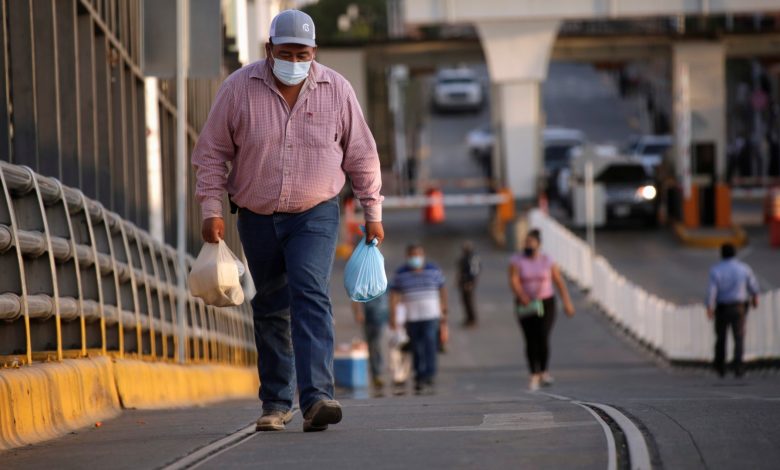
Curfew in Germany’s largest cities
حظر تجول في كبرى مدن ألمانيا
AFP – WGOQatar Translations
Berlin: Several German cities, including Berlin, are due to impose a curfew on Saturday amid a worrying rise in the number of infections from the Covid-19 epidemic, a move that has raised concerns in the restaurant and pub sector.
In Berlin, bars and restaurants have to close from Saturday evening between 23:00 and 06:00, a time period that often sees tens of thousands of people flock to the capital’s bars, which remain open overnight.
The curfew covers all shops except pharmacies and gas stations and will remain in place at least until October 31st. It will also prohibit the sale of alcohol at gas stations.
Frankfurt took similar measures, which came into effect on Friday evening, with bars and restaurants closed and alcohol sales banned between 22:00 and 06:00.
Cologne, the capital of North Rhine-Westphalia, Germany’s most populous region, also announced similar closure measures on Saturday morning as of 22:00.
For the seventh day in a row, Germany’s infection rate exceeded the 50 per 100,000 population threshold, meaning at least 50 new infections per 100,000 people are recorded daily.
In Berlin, the new measures are a severe hit to the city’s economy, which has already been hit hard by the closure of bars and nightclubs for several months.
The German capital’s nightlife is one of the most important components of its economy. The nightclubs made €1.5 billion in revenue to the city in 2018.
However, the epidemic situation is worrying in the city, with more than 400 new daily infections recorded. Berlin has become a “dangerous area.”
“This is not the time for staying out at night,” said Mayor Michael Mueller, adding that “we can and should prevent another more stringent closure” of the city, especially to those under 40.
Chancellor Angela Merkel also called for measures on Friday after a meeting with mayors of the country’s 11 largest cities.
“I am well aware that restrictions such as a time for closure and strict rules for the sale of alcohol are cumbersome and that the restaurant sector has been severely damaged,” she said, adding that “we have to determine what is most important to us this fall and this winter.” The “priorities” were to protect the economy and to continue school activities.
“After three glasses of wine, our respect for the rules of physical distancing is weakened,” said Dirk Berndt, a berlin judicial official.
The Berlin Bar Association, in turn, sees the measure as “catastrophic” and intends to appeal the decision to the courts.
“I don’t find the right words and I feel angry and resentful,” one of the group’s founders, Roberto Matofel, told the Berlin Economic Affairs Committee on Wednesday. The curfew, the first in the capital since 1949, threatens to strike a “fatal blow to the bars”.
In 2018, Berlin had 9,800 facilities in restaurant sector, including more than 1,700 bars or nightclubs, according to the Statetista Statistics Center.
In Frankfurt too, the fret swells.
The Frankfurt Restaurant Initiative is threatening to file legal complaints against the closure measure, which, it said, could lead to random street gatherings.
To avoid this danger, Berlin has also decided to place severe restrictions on social communication.
Between 23:00 and 06:00, gatherings outside should not exceed five people. During the day, it cannot exceed 50.
That did not prevent face masks opponents from calling again for a demonstration in central Berlin on Saturday afternoon.
These restrictions are more stringent for house gatherings, which should not exceed 10.
The measures are aimed specifically at preventing evenings at homes and illegal parties, which berlin authorities consider to be a source of outbreaks.
أ ف ب
برلين: تعيد عدة مدن ألمانية من بينها برلين اعتباراً من السبت فرض حظر تجول وسط ارتفاع مقلق لعدد الإصابات بوباء كوفيد-19، في خطوة تثير مخاوف قطاع المطاعم والحانات.
في برلين، على الحانات والمطاعم إغلاق أبوابها اعتباراً من مساء السبت بين الساعة 23,00 والساعة 06,00، وهي فترة زمنية تشهد غالباً خلال عطل نهاية الأسبوع تدفق عشرات آلاف الأشخاص إلى حانات العاصمة التي تبقى مفتوحةً طوال الليل.
ويشمل حظر التجول هذا كافة المتاجر ما عدا الصيدليات ومحطات الوقود، وسيبقى مفروضاً على الأقل حتى 31 أكتوبر. كما سيمنع بيع الكحول في محطات الوقود.
واتخذت فرانكفورت تدابير مماثلة، دخلت حيز التنفيذ مساء الجمعة، مع إغلاق الحانات والمطاعم ومنع بيع الكحول بين الساعة 22,00 و06,00.
وأعلنت كولونيا عاصمة منطقة شمال الراين-وستفاليا، أكبر مناطق ألمانيا من حيث عدد السكان، صباح السبت أيضاً عن تدابير إغلاق مماثلة اعتباراً من الساعة 22,00.
وتخطى معدل الإصابات في ألمانيا لليوم السابع على التوالي عتبة الخمسين إصابة لكل 100 ألف نسمة، ما يعني تسجيل 50 إصابة جديدة يومية على الأقل بين كل مئة ألف شخص.
في برلين، تشكل التدابير الجديدة ضربة قاسية لاقتصاد المدينة، الذي سبق أن تضرر كثيراً من إغلاق الحانات والنوادي الليلية لعدة أشهر.
وتشكل الحياة الليلية في العاصمة الألمانية أحد أبرز مكونات اقتصادها. وعادت النوادي الليلة على المدينة بعائدات قيمتها 1,5 مليار يورو في عام 2018.
لكن الوضع الوبائي يثير القلق في المدينة مع تسجيل أكثر من 400 إصابة يومية جديدة. وباتت برلين مصنفة “منطقة خطرة”.
وقال رئيس بلدية العاصمة مايكل مولر “ليس هذا وقت السهر”، مضيفاً “يمكننا بل نريد منع إغلاق عام آخر” أكثر تشدداً، متوجهاً بكلامه خصوصاً إلى من هم دون 40 عاماً.
كما دعت المستشارة أنغيلا ميركل بنفسها لفرض التدابير الجمعة بعد اجتماع مع رؤساء بلديات المدن الـ11 الأكبر في البلاد.
وأوضحت المستشارة “أنا أعي تماماً أن القيود كفرض وقت للإغلاق والقواعد المشددة لبيع الكحول، مرهقة وأن قطاع المطاعم قد تضرر بشدة”، مضيفةً “لكن علينا أن نحدد ما هو الأهم لنا هذا الخريف وهذا الشتاء”. وقالت إن “الأولويات” هي حماية الاقتصاد ومواصلة الأنشطة المدرسية.
من جهته قال مسؤول القضاء في برلين ديرك بيرندت “بعد ثلاثة كؤوس من النبيذ، يضعف احترامنا لقواعد التباعد الجسدي”.
ويرى تجمع حانات برلين بدوره التدبير “كارثياً” ويعتزم استئناف القرار أمام القضاء.
وقال الأربعاء أحد مؤسسي التجمع، روبرتو ماتوفل أمام لجنة الشؤون الاقتصادية في برلين “أنا لا أجد الكلمات المناسبة وأشعر بالغضب والاستياء”. ورأى أن حظر التجول وهو الأول في العاصمة منذ عام 1949، يهدد بتوجيه “ضربة قاضية للحانات”.
في عام 2018، كانت برلين تضم 9800 مؤسسة في قطاع المطاعم بينها أكثر من 1700 حانة أو ناد ليلي، وفق مركز “ستاتيستا” للإحصاءات.
في فرانكفورت أيضاً، الحنق يتصاعد.
وتهدد جمعية “مبادرة فرانكفورت لقطاع المطاعم” بتقديم شكاوى قضائية ضد تدبير الإغلاق الذي من شأنه أن يؤدي، كما قالت، إلى تجمعات عشوائية في الطرقات.
ولتفادي هذا الخطر، قررت برلين أيضاً وضع قيود مشددة على التواصل الاجتماعي.
وبين الساعة 23,00 و06,00، لا يجب أن تتخطى التجمعات في الخارج الخمسة أشخاص. وخلال اليوم، لا يمكن أن تتخطى الخمسين.
وذلك لم يمنع معارضي وضع الكمامات من الدعوة من جديد إلى تظاهرة في وسط برلين بعد ظهر السبت.
وهذه القيود مشددة أكثر على التجمعات الداخلية التي لا يجب أن تتخطى عشرة أشخاص.
وتستهدف التدابير خصوصاً منع السهرات في البيوت والحفلات غير القانونية، التي تعتبرها سلطات مدينة برلين مصدرا لتفشي الفيروس.



